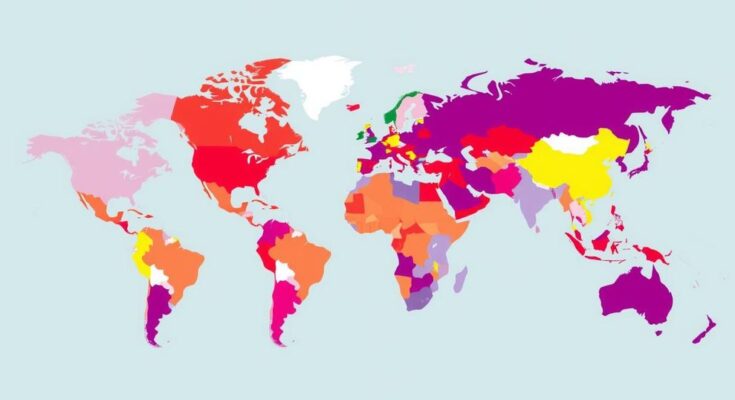The U.S. Department of State has heightened travel advisories for numerous countries due to rising safety concerns. Level 4 advisories indicating “Do Not Travel” have been issued for nations such as Afghanistan, Venezuela, and Haiti, primarily due to escalating violence and political instability. As spring break approaches, travelers are urged to reconsider their plans and prioritize safety amidst these advisories.
In a recent development, the U.S. Department of State has issued Level 4 travel advisories for several popular spring break destinations, including Russia, Jamaica, Colombia, Belarus, Yemen, Syria, and others. These warnings have arisen due to escalating issues such as crime, political instability, gang violence, and terrorism. The change in advisory status will impact American tourists’ perceptions of these traditionally favored locations as spring break approaches.
Many of the places affected have been historically appealing to American travelers for their rich culture and scenic attractions. However, recent advisories indicate a concerning rise in violent crime, including kidnappings and civil unrest in vital tourist areas. The U.S. government’s response is aimed at ensuring traveler safety amidst these heightened risks.
The travel advisory system employed by the U.S. Department of State is crucial for informing American citizens of safety risks abroad. Level 4 advisories signify extreme caution due to situations involving conflict and instability. As of early 2025, multiple countries fall under this category, including Afghanistan, the Democratic Republic of the Congo, and Venezuela, among others.
Afghanistan’s security situation remains critical, primarily due to the Taliban’s actions resulting in widespread violence and limited infrastructure. Travelers face significant risks of kidnapping and terrorist activities, prompting the U.S. Department of State to advise against all travel to the country.
In the Democratic Republic of the Congo, decades of conflict and violence by armed militias create an unsafe environment for travelers. Insufficient infrastructure and law enforcement further complicate safety, leading to strong discouragement from traveling to this region.
Lebanon suffers from political unrest and economic instability, which has resulted in unsafe conditions for visitors. The ongoing governance crisis, coupled with prevalent gang-related violence, has prompted the U.S. government to issue severe travel warnings.
The Central African Republic is facing dire consequences due to civil conflict and widespread violence. U.S. citizens are urged to avoid travel here due to the dangers posed by armed groups and a lack of law enforcement and healthcare availability.
Belarus also presents significant risks due to political repression and tensions associated with the ongoing conflict between Russia and Ukraine. Travelers may face harassment and potential legal issues, making it a high-risk destination for American citizens.
Similarly, Iraq remains perilous due to the active presence of ISIS and other armed groups. Travelers are advised to avoid the country completely due to persistent violence and kidnapping threats.
Due to the war between Russia and Ukraine, the latter is experiencing severe security challenges, creating a hazardous environment for American citizens. The government has firmly advised against traveling to Ukraine until further stability is achieved.
Venezuela’s socio-economic collapse has led to high crime rates and severe public service failures. Travelers are at significant risk, contributing to the U.S. advisories against travel.
Haiti is currently plagued by gang violence and political instability, particularly in Port-au-Prince, making travel there exceedingly dangerous. The U.S. Department of State has issued a Level 4 advisory against all travel to Haiti.
Iran presents ongoing tensions for Americans, including risks associated with political detention and governmental abuses. Consequently, the U.S. government consistently advises against travel due to these risks.
The common thread among these countries under Level 4 travel advisories is ongoing violence, political instability, and significant risks to personal safety. Travelers are strongly urged to remain informed about their destinations and consider the serious nature of these advisories.
For those who still intend to travel to high-risk areas, it is essential to adhere to safety protocols. Recommendations include regularly checking travel advisories, enrolling in the Smart Traveler Enrollment Program (STEP), acquiring comprehensive travel insurance, and maintaining contact with local embassies.
The implications of these travel advisories extend to the travel industry, influencing airlines and tour operators as they reassess their offerings. The demand for travel insurance covering emergencies is expected to rise as travelers remain concerned about their safety. Despite these risks, some travelers may continue planning trips to these destinations, often unaware of the dangers involved.
As American travelers approach the spring break season, they must remain cognizant of the increasing safety risks in various regions. The issuance of Level 3 and Level 4 travel advisories emphasizes the essential need for travelers to prioritize safety and informed decision-making. The travel industry will likely evolve in response to these growing concerns, underlining the importance for tourists to stay informed and cautious while planning their journeys.
Original Source: www.travelandtourworld.com




